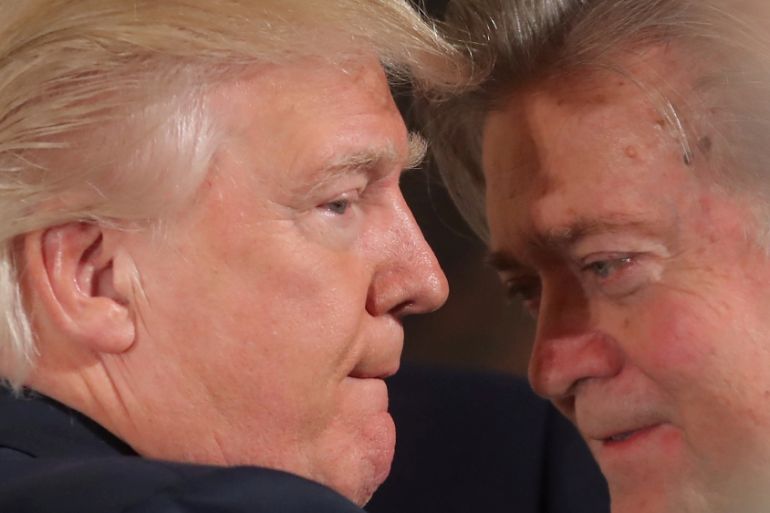January 6 panel moves to hold ex-Trump adviser Bannon in contempt
Donald Trump’s former political adviser Steve Bannon refuses to comply with a subpoena to testify about Capitol riot.

A United States congressional committee investigating the deadly January 6 Capitol insurrection will meet next week to advance contempt charges against Steve Bannon, a former top political adviser to ex-President Donald Trump.
Bannon, who helped Trump win the White House in 2016, has refused to be interviewed or turn over documents subpoenaed by the US House of Representatives panel unless ordered to do so by a court.
Keep reading
list of 4 itemsUS House panel subpoenas organisers of January 6 Trump rally
Republicans boycott January 6 probe after Trump allies rejected
US House forms panel to probe January 6 attack on Capitol
“We reject his position entirely,” committee chairman Bennie Thompson said in a statement on Thursday. “The select committee will not tolerate defiance of our subpoenas, so we must move forward with proceedings to refer Mr Bannon for criminal contempt.”
Thompson said the committee would meet on October 19 to vote on adopting a contempt report setting out the case against Bannon, who was let go of his position as White House adviser in 2017.
Thompson also slammed Bannon for “hiding behind the former president’s insufficient, blanket and vague statements regarding privileges he has purported to invoke”.
Trump, who continues to claim without evidence that the 2020 election was rigged, had sought to invoke “executive privilege” to block the release of White House documents related to the deadly events of January 6. US President Joe Biden’s administration rejected that effort last week.
The January 6 committee, which is composed of seven Democrats and two Republicans, has filed subpoenas seeking interviews and written statements from several members of the former Trump administration as part of its investigation into the events of that day.
A mob of Trump supporters stormed the US Capitol building on January 6 as Congress was set to certify President Joe Biden’s 2020 election victory. The insurrection took place shortly after Trump gave an incendiary speech in Washington, DC.
The House committee has called on about a dozen people involved in organising and producing Trump’s January 6 rally to testify, and it has also demanded records from social media platforms including 4chan, 8kun, Parler, Telegram, SnapChat and others.
It issued a new subpoena on October 13 to Jeffrey Clark, who served as acting Attorney General in the closing days of the Trump presidency.
Two other witnesses, former Trump White House Chief of Staff Mark Meadows and Defense Department official Kash Patel, were expected to appear for interviews this week, committee members said. Former White House Deputy Chief of Staff Dan Scavino also has been subpoenaed.
In a letter to Bannon, Thompson alleged the former Trump aide was part of “an effort to persuade Members of Congress to block certification” of Biden’s election win. “You are quoted as stating, on January 5, 2021, that ‘[a]ll hell is going to break loose tomorrow,'” Thompson wrote.
But a lawyer for Bannon informed the committee in an October 7 letter that Bannon would not comply with the investigation because Trump is asserting executive privilege.

In a statement a day earlier, Trump had called the committee “partisan”, disparaged its two Republican members as “pathetic” and reasserted his unfounded claims that “the real insurrection” happened on November 3 – the day of the US presidential election.
But in his statement on Thursday, Thompson said the committee “will use every tool at its disposal to get the information it seeks and witnesses who try to stonewall the Select Committee will not succeed”.
Representative Liz Cheney, who was among only 10 Republicans to vote for Trump’s impeachment for “incitement of insurrection” in relation to the January 6 riot, said earlier this week that she would support contempt charges.
“In general, people are going to have to appear, or, you know, we will move contempt charges against them,” Cheney said, adding that the entire committee was in agreement on that point.
Contempt of Congress is a criminal offence that can carry a penalty of up to 12 months in jail.
Under long-established procedure, Congress refers contempt complaints to the US Justice Department, which would then prosecute the matter in US court.